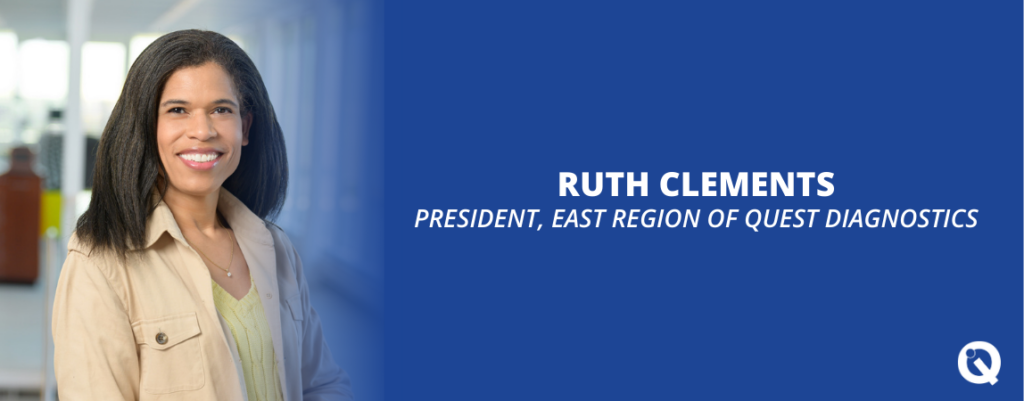Quest Diagnostics is a member of the Quality Institute’s Provider Council.
You have a long history at Quest Diagnostics, including leading Quest for Health Equity, a dedicated team working to help remove the barriers deepening health inequities in under-resourced communities, while improving equity in testing, screening, and diagnosis. Can you share a success through this work in improving health equity and breaking down barriers?
I’m immensely proud of our Quest for Health Equity (Q4HE), the $100+ million initiative of Quest Diagnostics and the Quest Diagnostics Foundation to support initiatives aimed at eliminating health care disparities that impact marginalized and under-resourced communities across the U.S.
COVID-19 demonstrated how longstanding health inequities can have a catastrophic impact on the health outcomes of communities of color and Choose Healthy Life (CHL) is one of the first organizations that Quest teamed up with back in 2021. Our partnership with CHL focused on establishing and supporting Black churches with the necessary resources, training, and support to address health disparities in hard-to-reach communities to help combat COVID-19 by offering testing as well as vaccinations to nearly 100,000 individuals in hard-to-reach communities. As a founding sponsor, Quest provided financial support through the Quest Diagnostics Foundation and donated diagnostic testing and other services to CHL as part of Q4HE.
We’re building on that commitment in marginalized communities with Blueprint for Wellness, a comprehensive health screening that provides powerful information to highlight your personal health strengths, but also your health risks. We complete a battery of tests and if there are any results in the red, you get connected to a primary care provider. I’ve seen the participants who are receiving diagnostic screening for the first time in decades, and it’s truly been rewarding to see people engaging with their health care.
Quest is a New Jersey-based company and a large employer. How does that inform your investments here in improving access and health outcomes in the garden state?
With our Quest Diagnostics headquarters in Secaucus and our largest diagnostic lab in Clifton, we are proud to call New Jersey home and help in our communities. We have several New Jersey initiatives such as the Q4HE collaboration with the Health Coalition of Passaic County and their Women’s Health Task Force. For Maternal Health Awareness Day, we teamed up to provide free resources with the coalition and their partnering organizations to raise awareness of health disparities among Black women and Black mothers.
We also expanded our collaboration with Rutgers University to improve access to critical primary care services for uninsured and underinsured patients of the Rutgers H.O.P.E. Clinic in Plainfield, where Quest provides no-cost lab tests for patients with chronic conditions such as diabetes, hypertension, sexually transmitted infections, and Lyme disease. In addition, we provided funding through the Quest Diagnostics Foundation that enabled the clinic to double its capacity by providing primary care services.
During a Quality Institute regional event last year, Quest and Hackensack Meridian Health outlined efforts to identify specific strains of hospital-acquired infections. Can you update us on that work?
The Quest research collaboration with the Center for Discovery & Innovation (CDI), a member of Hackensack Meridian Health, is critical to our understanding of the hospital-acquired infections Carbapenem-resistant Klebsiella Pneumoniae (CRKP) and Klebsiella Pneumoniae. With Quest’s national reach, we were able to expand our sample area and look at the whole genome sequencing of these infections, expanding our knowledge of these potentially dangerous organisms. We are at a tipping point with organisms showing that they are resistant to known antibiotics. I hope that our collaborative research will help guide physicians on effective antibiotic use and be a call to action for even more studies in this area. The research studies with CDI have been immensely productive in just a short amount of time, and we look forward to continuing that collaboration.
How does Quest support primary care practices managing their patients’ overall health and what technology advancements in this work are you most excited to share?
Quest’s diagnostics testing gives the physician community the information they need to make critical decisions in patient care. Our Quest employees understand that every day their work makes a difference in the health of our friends, family, and communities.
Before introducing automation in our microbiology department, we asked our employees what would make a true difference. We wanted meaningful changes for our employees, our physicians, and our patients. One area was around incubation, which takes time, and then reading the cultures takes time. Introducing microbiology automation enables us to have touchless processing — from receipt of the specimen to the results, allowing us to reduce the incubation time for several culture types between 25 percent to 60 percent, depending on the test. Automation has decreased the time that we are spending on negative cultures, and we can focus on making the most accurate and efficient reading of positive cultures. It allows our physicians to treat patients faster and more accurately than ever before.
Finally, we like to ask a question beyond a person’s professional work. If you could choose anyone (throughout history or alive today), who would be your hero?
Thinking about history, I would say Harriet Tubman. She was a true icon of freedom and an example many women leaders follow to this day.
If I look at somebody who would be alive today, I will say my mother, who is in the beginning stages of dementia or Alzheimer’s. It’s a difficult journey because she’s aware of it — and I can see her coping the best that she can, even though it’s changing her. It makes me even more passionate about the need for health care and screening and therapies. I’m seeing my mother also demonstrate to me, again, what a strong woman she has always been and continues to be despite what she’s going through.

